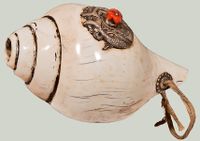Conch: Difference between revisions
Jump to navigation
Jump to search
mNo edit summary |
No edit summary |
||
| Line 1: | Line 1: | ||
[[Image:Conch.jpg|thumb|200x200px|frame|White Conch]] | [[Image:Conch.jpg|thumb|200x200px|frame|White Conch]] | ||
'''Conch''', '''white conch''' or '''dungkar''' (Skt. ''shankha''; [[Wyl.]] ''dung dkar | '''Conch''', '''white conch''' or '''dungkar''' (Skt. ''shankha''; Tib. དུང་དཀར་, ''dungkar'', [[Wyl.]] ''dung dkar'') — a large white seashell which was used in Indian religious ceremonies, and also warfare, and was hence adopted in tantric Buddhist rituals. Usually one plays in a pair in which the musicians alternate in taking breath, to ensure the continuity of the sound. | ||
Out of the [[four activities|four enlightened activities]], the conch is related to pacifying. | Out of the [[four activities|four enlightened activities]], the conch is related to pacifying. | ||
[[Category:Musical Instruments]] | [[Category:Musical Instruments]] | ||
Latest revision as of 21:41, 10 June 2018

Conch, white conch or dungkar (Skt. shankha; Tib. དུང་དཀར་, dungkar, Wyl. dung dkar) — a large white seashell which was used in Indian religious ceremonies, and also warfare, and was hence adopted in tantric Buddhist rituals. Usually one plays in a pair in which the musicians alternate in taking breath, to ensure the continuity of the sound.
Out of the four enlightened activities, the conch is related to pacifying.